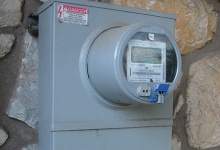
Smart meters, the next generation of power meters for homes and businesses, are currently being rolled out across many countries, including the US, Europe, China and Japan.
However, despite smart meters being celebrated by legislators and many energy experts, not everyone is onboard with the smart meter revolution.
Some campaign groups in both the UK and the US believe smart meters to be unnecessary health and security risks that are simply part of ‘a global smart grid agenda’.
Stop Smart Meters UK, a campaign group against smart meters, say they create "documented (and suppressed) health risks, unwarranted privacy violations and safety issues to the loss of sovereignty and control of our property in our own homes."
How well do you really know your competitors?
Access the most comprehensive Company Profiles on the market, powered by GlobalData. Save hours of research. Gain competitive edge.

Thank you!
Your download email will arrive shortly
Not ready to buy yet? Download a free sample
We are confident about the unique quality of our Company Profiles. However, we want you to make the most beneficial decision for your business, so we offer a free sample that you can download by submitting the below form
By GlobalDataSee Also:
Adding to the campaign, in September a US film called Take Back Your Power was released, which questions the benefits of smart meter and grid technology and "corporate practises to tap private information".
The film talks to, among others, a former senior executive at the National Security Administration (NSA), American computer specialist and former CIA and NSA employee Edward Snowden and a former Apple executive.
Security issues – privacy, hacking and terrorist attacks
So what privacy and security risks do smart meters pose? Smart meters send information about a household’s energy use back to the utility provider via wireless communications technology within the smart meter.
Dr Elizabeth Evans, a qualified doctor who no longer practises but is now a Nambudripad Allergy Elimination Technique practitioner and co-founder of the Stop Smart Meters UK website, believes this information is extremely valuable to energy companies, government organisations, marketing organisations and other third parties, including hackers and organised criminals, and therefore is vulnerable.
"The detailed information will allow for deep analytics and profiling technologies to be applied to energy users, for detailed energy / appliance / device usage, etc. to be built," Dr Evans says.
"There have been numerous occasions where wireless smart meters have been shown to be easily hacked; for example, a group of ethical hackers showed how easy it was to hack a Discovergy smart meter less than two years ago at a conference in Berlin," she adds.
The incident Dr Evans refers to regarding Germany-based Discovergy is said to have occurred when the company allowed information gathered by its smart meters to travel over an insecure link to its servers.
When asked, British Gas, which has already started fitting smart meters for its customers, said a daily, or at minimum, monthly reading will be sent to suppliers, with customers needing to provide express permissions for half hourly readings. Adding to that, the only other information sent to a supplier is if the anti-theft tamper alarm is raised so that the meter can be made safe.
A British Gas spokesperson added: "Smart meters must meet a number of security standards specified by Department of Energy and Climate Change (DECC). DECC has brought in a number of security consultants to ensure data is protected and to allow draft license obligations to be prepared."
The company adds that the meters store data in the meter using methods "widely used across a number of industries such as banking and telecommunications" and is sent using Advanced Encryption Standard, which is more complex than what is used for internet banking.
David Emm, senior security researcher in the UK for Kaspersky Lab, a worldwide IT security company, says although smart meters have obvious benefits, "there are potential risks".
"If someone is able to intercept such transmissions, they could gather personal information, interrupt the supply to the customer, or send false data – resulting in huge bills for those affected, or loss of revenue for suppliers.
"If the interruption of power could be done for large numbers of customers at once, this could result in an outage that, before the advent of smart meters, would have meant an attack on the power supplier’s systems," he suggests.
He added, however, that encryption of data being sent and received is the key to protecting it and would "greatly reduce the risk of attack".
Health risks from radiation
Those calling for an immediate halt and reversal of the US and UK’s smart meter programme also believe smart meters can cause headaches, insomnia, sleep disorders, depression and arrhythmias in the short term and even cancer, DNA damage, infertility and, among other things, damage to foetuses, in the long run.
Smart meters use radiofrequency waves to communicate the information they collect and transmit. There are many other everyday devices that use radiofrequency waves for communication purposes and these include radio / television transmitters, mobile phones and wireless (Wi-Fi) computers.
"Radiofrequency radiation was classified as a 2B (possible) carcinogen in 2011 by the IARC [part of the World Heath Organisation]," says Dr Evans.
"Putting a device that emits this radiation 24/7… into every home in the UK will expose everyone – adults, children, babies and foetuses in utero – to this carcinogen completely involuntarily."
Dr Evans also highlights the fact that, unlike mobile phones or WIFI, people will be unable to turn a smart meter off in order to limit their exposure. She raises concerns about the cumulative impact of all these devices, which may result in households exceeding the ‘woefully inadequate’ International Commission on Non-Ionizing Radiation Protection’s (ICNIRP) safety levels set in 1998.
The American Academy of Environmental Medicine in April 2012 called for immediate caution regarding smart meter installations and for more research to be conducted, due to "patients reporting to physicians the development of symptoms and adverse health effects after ‘smart meters’ are installed on their homes."
Furthermore, Dr Evans raises concerns about the unknown impact, due to the constant use of radiofrequency radiation omitting devices being a relatively new phenomenon: "An "epidemic" in early onset dementia is being reported by doctors, as well as an obesity epidemic – all rising in line with the rise in wireless technology use and radiofrequency radiation pollution – both conditions have been linked to chronic radiofrequency exposure."
Although it’s very hard to quantify the long term results of prolonged exposure to radiofrequency, it’s worth remembering there are many things in modern day life that can be identified as carcinogenic, from charred food to Asbestos. It’s the strength and level of exposure that is important to note when considering possible detrimental health effects.
Public Health England’s (PHE) stance is that there is no evidence to suggest exposure to the radio waves produced by smart meters poses any health risk.
"Assessments of smart meter systems in other countries have found exposures that are small in relation to the ICNIRP guidelines and there is no reason to think that the situation would be any different in the UK," it states on the PHE website.
To further corroborate these assessments, the PHE will be carrying out further research as smart meters are rolled out.
Yoav Zingher, a director of KiWi Power, who works with remote demand response technology, disagrees with Dr Evans’ argument: "I don’t mind saying that is just not an argument, we have more radiation from phones than we do smart meters and we’re all happy with our phones."
David J. Brenner Higgins, professor of radiation biophysics at the Center for Radiological Research Columbia University Medical Center, offers his opinion: "While it’s always hard to prove that something is "safe", wireless smart power meters result in significantly less radiofrequency radiation exposure than produced by cellphones, so it is very unlikely they would be associated with adverse health effects."
What’s the truth? It’s hard to tell
It seems the ‘truth’ about smart meters is very subjective – it depends who consumers choose to believe; you’ll find studies and arguments both for and against smart meters wherever you turn.
However, a few things seem consistent. Hacking of energy data from individual homes does seem to be a possibility, just as hacking any other computer run company is – just last week an attempt to hack a Santander bank computer was foiled with 12 arrested.
It comes down to a question of the likelihood of this happening and trust that the relevant level of encryption and security is employed and is not being collected for sinister capitalist motives, as has been suggested. The DECC will not make all necessary smart meter security measures public for security reasons.
It’s possible that long term exposure to radiation could have detrimental health impacts 30 to 40 years down the line or even immediately. But nobody really knows as it’s hard to prove.
If a consumer is unconcerned by WIFI and mobile phone radiation they’re unlikely to be concerned about radiation omitted via smart meters – but if they are they should have the choice to say no, which they do in the UK. However, in the US there have been reports of smart meters being fitted without prior consent.
Further studies and looking to the US, which is years ahead in its smart meter roll out, will hopefully provide further clarity on these issues in the near future.
Related content
The smart meter revolution: end-user technology round-up
A smart meter revolution is underway throughout the US, Europe, China and Japan, with wireless, data hungry ‘smart’ meters replacing old fashioned ‘dumb’ meters in homes and some businesses.
UK smart meter roll-out – what should households expect?
The Energy and Climate Change Committee issued a report last week on the smart meter roll-out that is set to begin in 2015 and reach completion in 2020.


.gif)





